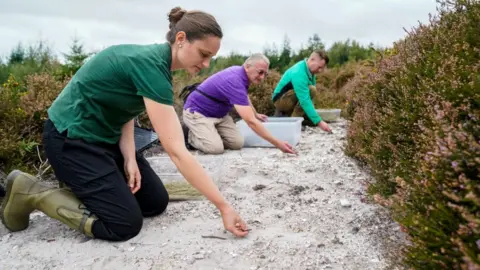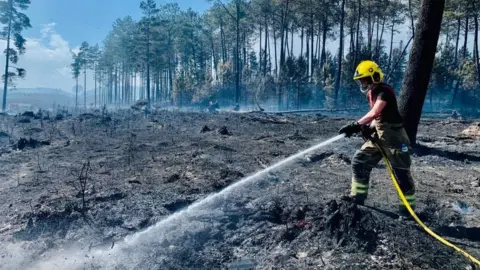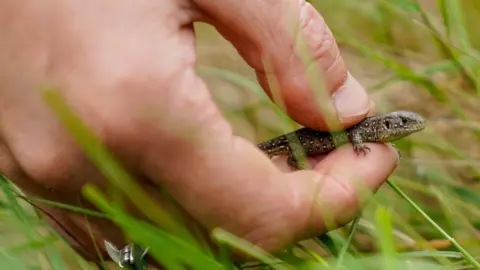Wareham Forest fire: Sand lizards released to combat falling numbers
 Marwell Wildlife
Marwell WildlifeRare sand lizards have been released into a Dorset forest to replace the hundreds which perished in a wildfire.
The blaze at Wareham Forest earlier in the year damaged 550 acres of land, much of which is designated as a Site of Special Scientific Interest (SSSI).
A team of volunteers rescued some reptiles in the days after the fire but hundreds of sand lizards were lost.
More than 200 of the reptiles, bred at Marwell Zoo, have now been released into nearby Puddletown Forest.
 DWFRS
DWFRSMark Warn, wildlife ranger for Forestry England in Dorset, said: "Heathlands across Dorset provide some of the best habitat in the country for sand lizards and it was absolutely heartbreaking to see so much of that destroyed by the recent wildfire.
"It's brilliant to be involved in the release of so many young sand lizards and we will work hard to support their habitat and keenly monitor their progress."
Once common in heathlands across southern England, habitat loss means sand lizards are now only found in a handful of sites.

 Marwell Wildlife
Marwell WildlifeSand lizard facts:
- They live on protected heathland sites in Surrey, Dorset, Hampshire and in the protected Merseyside dunes.
- They grow up to 20cm (7.8in) long and weigh about 15g (0.5oz).
- Both sexes have brown patterns down their backs with two stripes.
- Their diet is mainly insects, spiders and grasshoppers.

The fire at Wareham Forest started on 18 May and it took four million litres of water to extinguish the flames over a period of more than two weeks.
Investigators believe it was caused by a disposable barbecue or camp fire.
Managed by Forestry England, Wareham Forest covers 1,500 hectares in total, one third of which is designated as an SSSI and is home to rare birds, plants, reptiles, and invertebrates.
